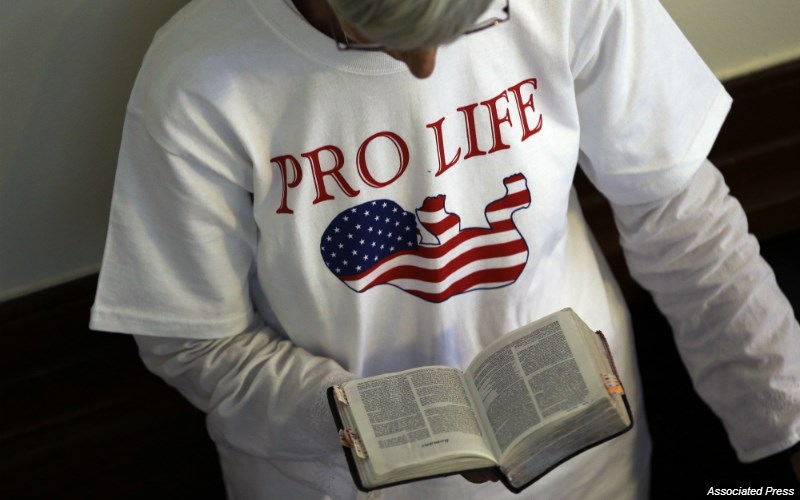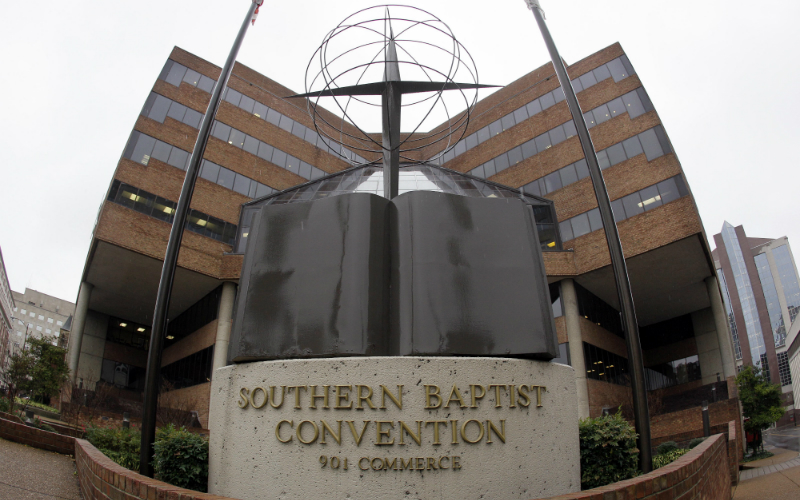Last Thursday, Politico posted commentary from Bradley Onishi, a former youth pastor and now a professor of religion at the University of San Francisco, that says the Bible's position really isn't pro-Life.
He's not the first to make that assertion. MSNBC's Joe Scarbrough on his show said Christian leaders and Republicans joined forces to make the abortion discussion a tool to win votes. "They invented the issue of abortion not just as a political issue, they said, 'We're going to make it a religious issue," said Scarbrough, citing Jerry Falwell as complicit in this movement.

Onishi agrees. He writes that Alabama Supreme Court Justice Tom Parker, in his opinion on that court's position that frozen embryos created during in vitro fertilization (IVF) are humans, got it wrong. Parker, he argues, was simply following a GOP pied piper plan to win votes, as Scarbrough suggests.
"Parker is repeating a political mantra concocted by Republican operatives in the late 20th century in a successful effort to create a conservative Catholic-Protestant voting bloc capable of taking over the GOP – and implementing their religious-political vision throughout the country," Onishi writes.
In search of biblical context
That's not how David Closson, the Family Research Council's director for Center for Biblical Worldview, sees it. Closson, appearing on Washington Watch Friday, said Onishi's piece lacks biblical context. Had Onishi studied scripture and church history more deeply, said Closson, he'd have found many theories opposed to the one he puts forth in his story.
"They never quote a single verse – and there's a reason they don't quote a single verse: it's because if they were to open the scripture in the Old Testament or the New Testament, you would see that the Bible is pro-life from cover to cover. The Church got that right for basically 2,000 years.
"From the first century, one of the very first moral ethics books that early Christians used, the Didache, it literally says, 'You shall not murder a child by abortion nor kill that which is begotten," Closson quoted.
The Didache is considered to be a work of patristic literature from an Apostolic father, one of a group who is believed to have had personal contact with the Apostles. It deals with morals, ethics, church practices and the eschatological hope of Christ's second coming at the end of time.
The Didache's stance on life continued into the Reformation Period with theologians like Martin Luther and John Calvin.

"This list goes on and on. It's really a who's who of church history that has weighed in on this issue, and they consistently have said the Bible is pro-life," Closson said.
Onishi continues in his column: "Within the lifetimes of many of today's evangelical Christian believers, their churches either supported abortion rights or were neutral on it. In the 1960s and 1970s, Southern Baptists and other historically conservative Protestant denominations held that abortion was not only permissible, but also should be left to individual choice."
The SBC and abortion
On that point Onishi is correct. Christians have at times struggled with their response to the abortion question. Southern Baptists in the 1960s and early 1970s were particularly conflicted.
The Southern Baptist Convention in 1971 passed a resolution that some might consider pro-choice today. The resolution called upon Southern Baptists to work for legislation that will allow the possibility of abortion under such conditions as rape, incest, clear evidence of fetal deformity and carefully ascertained evidence of the likelihood of damage to the emotional, mental and physical health of the mother, according to The Baptist Press, the convention's official news service.
Closson said the SBC's position in 1971 was largely reflective of its leadership in education and some other areas. Change, however, would come before the close of the decade.
"It is true that some denominations, notably the Southern Baptist Convention in the 1960s, early 1970s were pro-abortion, but those were the leaders of those denominations – those who were leading the seminaries, those who were leading the entities," he explained. "And when … Southern Baptist rank and file began to find out what their leaders [actually] believed, well guess what? That's when you had the conservative resurgence by folks like Adrian Rogers in 1979 that drove all of those pro-abortion theologians out of the denomination within about a decade.
 "I think we actually need to have some historical context when we make these arguments," Closson added, in a veiled critique of Onishi's piece.
"I think we actually need to have some historical context when we make these arguments," Closson added, in a veiled critique of Onishi's piece.
Onishi's column cites Augustine and Aquinas in saying the Church historically has had greater tolerance for abortion. Closson disagrees.
"That argument [Onishi] is making is that there's been a distinction between pre- and post-quickening – the moment a mother can feel fetal movements – that prior to that moment the Church was kind of morally neutral."
In fact, one quote from Augustine does make this distinction, but Closson notes that Augustine was writing in the fourth century without the benefit of modern-day knowledge and technology. Even then, however, Augustine referenced the brutality of the act:
"Sometimes, indeed, this lustful cruelty, or if you please, cruel lust, resorts to such extravagant methods to destroy the conceived seed by some means previous to birth, preferring that its offspring should rather perish than receive vitality, or if it was advancing to life within the womb, should be slain before it was born," Augustine wrote.
Law practitioners recognized brutality of abortion
Common law practitioners in the Middle Ages and Renaissance periods also recognized quickening, Closson noted. While they stopped short of calling abortion murder, they were no less shocked by the act.
"Even if it wasn't murder, it was a heinous crime," Closson argued. "That's the language that common law practitioners used – they said pre-quickening abortion was still a heinous crime even if it didn't amount to murder.
"This idea that there's a squishy, middle, moral neutral going on, actually when you look at the common law theorists and you look at folks like Augustine, it doesn't add up, and it doesn't measure up to the arguments put forth by this writer [Onishi]," Closson said.







